
Exclusive Interview with Eddie Jordan
Atlas F1 Editor in Chief
The Jordan team have been in the spotlight recently, with reports last week suggesting the Silverstone-based marque has been sold to the ruling family of Dubai. Is Eddie Jordan on the way out of Formula One? Biranit Goren talked to the affable Irishman, about the rumours surrounding his outfit, next year's regulations, his engine deal and drivers for 2005, and the effect of the Vodafone verdict a year later
It's just that, recently, whatever topic you bring up with him has a shelf life of a few hours before it turns into yesterday's news.
And then we sat down for another interview, on the heels of Mosley's resignation from his position as FIA president. Mosley didn't even wait until that interview was written before he changed his mind, and another interview was lost.
By the Belgian Grand Prix last week, after numerous attempts, many Friday breakfasts and gossip over Salmon for lunch, it was obvious that the only way to do an interview with Eddie Jordan and live to see it remain relevant, is to talk to the Irishman on or about the same day the article is set for publication. Well, either that or steer clear of any topic that relates to Max Mosley.
Uncertain Times - Take I
After a weekend in Ireland, visiting his mother, Jordan is sat at the team's factory in Silverstone, moving from one meeting to another, constantly busy. "I'll be right with you darling," he says over the phone, and true to his word calls back in between yet another business conference or technical discussion.
Eddie Jordan is, above all, a charming man. He is engaging and funny; friendly and trusting. Which is why, just days before our appointed attempt at yet another interview, it was sad to read in the Daily Telegraph and the Irish Independent that Jordan may well have sold his team to the ruling family of Dubai, leaving EJ with only 15 per cent stake at the team he founded more than 13 years ago.
But Jordan dismisses these reports as inaccurate and is quick to assure that he's not going anywhere. Not yet, anyway.
"I can only imagine that [these reports] are a result of stories that appeared maybe a month or so ago [which had the Maktoums of Dubai linked to an F1 deal], and I can only assume that with other sports and the Olympics and things, it just hasn't reared its head until now," he says. "But it isn't accurate, it's not true. I am speaking to a number of different people about injecting cash into the company, but there is nothing secure and certainly nothing done."
BG: But are you indeed in negotiations with the representatives of the Dubai ruling family?
Jordan: "I have spoken to the people in Dubai, sure. Well, not to people in Dubai - I've spoken to people in the UK only, who represent them."
BG: Which, according to the reports, is Jenson Button's manager, John Byfield...
Jordan: "No, no, I actually never, ever spoken to John Byfield. In fact, the last time I have ever said a word to John Byfield - and I am literally talking about a word - was at the Japanese Grand Prix last year, which is coming up to a full year now, and I have never spoken to him since."
Jordan: "First of all, I reiterate, I have not agreed to any share sale; I have not finalised any share sale; and I've talked to a number of different people. But I've said for some time now - and I'm talking about more than a year - that Jordan is interested to get back to where it was and win races again. For this, we need to have a partner - you know, a little bit like what's happened with [Russian oil oligarch] Roman Abramovich and [British football club] Chelsea.
"We are not in a position to challenge somebody like Mercedes or BMW or Ferrari with the amounts of money that they spend on engine programmes and stuff like that, and sadly sport in general - not just motor racing - is becoming more governed by the amounts of money that you have; the more money, the better your results are going to be. It wasn't always that way and hopefully it won't be that way in the future, but right now it is, and Jordan needs this money injection now."
BG: But are you - one of the last privateers in Formula One - willing to give up ownership of your team for that?
Jordan: "No, but what I'd like to do is to either join with a very high worth individual or, preferably perhaps, a corporation or a company who can drive real value into the business of Jordan, and they can get a much stronger and a much more successful team than it has been in the last couple of years. So by that it means we should start at a 50-50 base or thereabouts - that's the ideal situation - and gradually they can take me out over a period of time, if that's what they want.
"Having shares is not necessarily the main crux, but right now I'm keen to maintain a shareholding, however small, because there are still things I want to do that I haven't yet realized the full benefit of. So from that point of view, yes, sure, I'd like to stay involved."
Uncertain Times - Take II
Eddie Jordan anticipates - or hopes - that whatever negotiations he is currently holding, be it with the Dubai royalty or others, will successfully end soon with a new partner in Jordan Grand Prix. Much like his neighbour at the paddock, Minardi owner Paul Stoddart, EJ has been struggling to keep his team running competitively for the last couple of years, and while he'd be the first to admit to his own failure in maintaining the team's success from the 1998-1999 seasons, he is also a victim of the increasing gap in Formula One between those teams that have, and those teams that don't. Or, in other words, the difference between the manufacturer-backed constructors, and the works engine-supplied privateers.
"Well, I fully understand the FIA's reasoning," Jordan says. "It's simple: a number of the teams are very keen not to take away the technical challenge, and the use of certain materials and blah, blah, blah. Now, there's no doubt that this adds a considerable cost for team owners like me, who just wants to go motor racing.
"So I get the impression that the FIA are saying, 'OK, you can do that, you can keep the technical challenge, but in this case you must provide these engines for free to other teams.' After all, the manufacturers have already saved a considerable amount of money by reducing the quantity of engines they have to produce.
"Two years ago, maybe five engines were required for a car per weekend - certainly eight engines per team per weekend, including the T car. Now it's down to two engines per team per weekend, and next year it may well be down to two engines per team for two weekends. So that gave them huge, huge savings in terms of quantity, and I suppose in many respects, if you would have now said, 'listen I want you to supply another team', it would still be a lot cheaper than what it was for them two years ago, supplying just one team.
"That's the first point. The second point is that it's actually a reasonably fair request, because the manufacturers can come in and go out of the sport, but it's the privateer teams that keep it running. You know, other than Ferrari, Jordan have been competing now in F1 consecutively longer than any of the existing automakers. Renault, Honda, BMW... As a car manufacturer, you have to say that they have been coming and going, and they have a huge platform for promotion, TV, all of the other aspects.
"I think that, because of this, some of the rationale behind the FIA's proposal is to be like Moto GP: you cannot enter Moto GP unless you are prepared to supply another team with equal and same equipment, and what I think Max [Mosley] is now telling the automakers is that he cannot let them run fancy engines - which the five manufacturers involved in the GPWC said publicly that these engines are costing them $1.2 billion a year - while their teams are not paying for these engines but a private team like ours has to spend $12 million for a less competitive unit. How can you have it competing against one that cost $250 million? Doesn't make sense.
"So I think probably what the FIA are trying to say to the automakers, in a roundabout way, is that the engines are either all going to be simple and equally affordable, or if they want their technically challenging fancy engines, then they've got to be free for all."
Jordan: "No, that was a surprise to me. But I think it was very clever. Very good idea."
BG: Well, let's see if the engine makers accept it...
Jordan: "Yeah... well, I don't know what is the answer to that. There are a number of different options, and I think it's only reasonable that each team would point out exactly what is their first preference, and so we'll see if there's any movement. But I hope some decision is reached soon, because more than anything we need some certainty and absolute clarity.
"We're now in September, and to think that we haven't got rules and regulations for next year is... for me, it's bordering on catastrophe. The small teams do not have the ability to do huge things at very short notice. There are certain elements in a car design that require lead-in time - gearboxes or survival cells, for example, require a certain time frame. If you shorten that time frame, then it becomes more expensive. So I hope a decision is made as soon as possible."
BG: When do you expect the decisions to be made, then?
Jordan: "You saw yourself what happened at the last race: teams got together, and some people are trying to vote for one engine for one weekend, others are going for one engine for two weekends, or they want something else. So it's really a minefield, and it sure hasn't been helpful for the smaller teams in having no decision at this stage. We'll have to wait and hear Max on Friday [in his press conference] and see what he's decided to do."
BG: Would it be correct for me to assume that right now, Max Mosley and Bernie Ecclestone are the only ones fighting for the survival of the smaller teams in Formula One? Because it doesn't seem like the automakers are doing anything to help you
Jordan: "Well I think it's possible that the FIA and Bernie believe that in the last 50 years, what has kept Formula One running year in year out were the private teams. The manufacturers come when it suits them, and they invest what they want to invest, and they go when it doesn't suit them anymore. And whilst that's perfectly OK, it's the small teams that have maintained this platform ready and warm and waiting for the manufacturers to come and play and then leave whenever they want to leave.
"Ford have probably been the exception - they have been involved in F1 for a long time and they've been supportive. And we should be supporting each other. I'm not sure why Ford have given so much to Formula One, but now they're getting a fair bit of stick for it and I wish they hadn't. I'd like to see Ford continue in Formula One; I think they're important."
Uncertain Times - Take III
Given that Minardi has been running three-year-old Cosworth engines this year, while Jordan have been running the same spec as Jaguar, questions have been raised whether the Jordan team are set to switch to a different engine - with some rumours even suggesting a Toyota deal in the horizon.
Not so, says EJ.
"We have an agreement with Ford," he clarifies. "I know that people are speculating about what's happening at Ford, but the conversations I have with Ford are fine - we'd all like to find more power, we're also all waiting to see what the rules and regulations are for next year; whether it's going to be an engine for two weekends or it's going to be for one. When we know that, we can actually get next year's agreement - and our budget - done."
BG: But what about trying to get a more competitive engine? I understand Cosworth have been good to you, but they're not the most powerful engine and there's always been talks about Jordan possibly getting a front runner engine. Is that not going to happen?
Jordan: "I think it's probably fair to say that Ford and Jordan have an agreement for the last two years, and I don't want to be in a situation where we change from that. But at the end of the day, we have to see what their situation is like, and just like some people are asking us if we'll be around next year, they're also asking that of Ford or Cosworth or Jaguar. It's a situation at the moment, and we have to see what happens there."
BG: Does Minardi's new deal with Cosworth affect the Jordan deal in any way?
Jordan: "No, not at all. But I think they probably have in the contract a couple of scenarios - if it's one engine per weekend or one engine per two weekends, then it's probably two different prices, because it's unlikely that it's the same price. It should be cheaper if it's one engine for two weekends - I know that from our dealings with Cosworth. So they've announced it and I'm delighted that Minardi has the income that allows them to go forward and do all the things they want to do."
BG: What I found encouraging is that Minardi are going to pay around 10 to 15 million USD a year, which brings it closer to your wish over the last couple of years to have a 10 million euros engine deal
Jordan: "I don't want to say to much about Paul's deal, because it's not fair, but I think he's alluding in the statement they released about the deal that it's a 10 million dollar deal, and you know, that's been quite a long time coming. We've been promised that from the beginning of 2003 and it didn't happen, so in a way it's a shame it's taken until the beginning of 2005 to happen.
"You know, when it was originally envisaged for 2003, we were still running 4 or 5 engines per car per weekend, and then it went to one engine per weekend, and now it's going to one engine per two weekends, so if it didn't get down to that 10 million bracket, I would say there would have to be some serious questions asked as to where could all of those engines and money have gone to."
Uncertain Times - Take IV
Jordan has a good record of Formula One star drivers igniting their career in one of his cars. The current grid includes Michael Schumacher, Rubens Barrichello, Ralf Schumacher, Jarno Trulli, Takuma Sato and Giancarlo Fisichella among the ex-Jordaneers. And if all of the above are set to race in a competitive or lucrative racing seat next year, Nick Heidfeld does not seem to be able to join them in finding a top drive.
It nearly happened, mind you, or so it seemed.
Just a few weeks before Williams made the surprise statement that Jenson Button will be switching back to the Blue and White overalls, German Heidfeld was among the favourites for the ride and in fact, Williams wanted to recruit him as a replacement for injured Ralf Schumacher, who's been sidelined since the US Grand Prix.
Jordan confirms the interest from Williams. He also confirms that he blocked the move. But, he says, it was all in the best interest of Heidfeld and in retrospect, he insists, it turns out he was right to do so.
"Frank realized that both his drivers had gone to new teams; he had [Juan Pablo] Montoya who's finishing out his contract and then Ralf got hurt. Therefore, on that basis, he wanted someone to fill in, and he had two test drivers he apparently wasn't entirely happy with. So I think he wanted to take Heidfeld now without having to commit to him for next year.
"Now, I said that I'd be happy to release Heidfeld if Williams is willing to give me a commitment in writing that he'll sign Heidfeld for next season. Heidfeld thought he was going to be released now, for the remainder of this season, and for next season. But Frank wouldn't put that in writing and I never saw that being offered. When I couldn't get that commitment, I wouldn't let him do the test. And I'm absolutely certain that there isn't a person in the world who wouldn't have done the same."
BG: So where does Nick stand now as far as next year goes?
Jordan: "I've made it very clear: if Nick can find a top seat for next year, I'd be delighted and I'd wish him absolutely the best. The only team where there was the slightest chance of it happening was Williams, and I believe that Williams had already made their choice of drivers when they offered Nick a test for this year. I was trying to get the letter, and when that letter didn't come I had to believe that there wasn't a drive for Nick next year there. A couple of weeks later, it appeared that I was right."
BG: Would Nick stay with you if he can't find a top drive, then?
Jordan: "That's another story. We have to sit down and talk, see what he wants to do and how he wants to go about it. But nothing has been discussed as yet, and maybe Monza is the likely place where we should start these discussions."
BG: In fact, what about your line up for next year? At what point do you actually expect to close your line up?
Jordan: "In the winter, probably. We want to see what is available, what sponsors are in touch, and when we know that and we know who's driving where and when, then we can make a decision. To be fair, Jordan in years gone by were chasing drivers here, there and everywhere. Now we need to see what is currently the best option for us - whether it's an experienced driver, whether it's a new driver, whether it's a driver that brings in a partner or sponsorship.
"Like with everything else right now, we just have to wait and see."
"So, what's new? Any Gossip?" Eddie Jordan joined the Atlas F1 journalists for lunch on race day at Belgium, looking hyperactive as ever.
"Not much, the Button Affair seems to have put the 'Silly Season' on hold," remarked GP editor David Cameron.
"Yes, well, that will probably end up in court," said EJ, in between Salmon bites.
"And the judge isn't going to be nice to one of the sides," David continued.
"Well, he" - I pointed at EJ - "already knows that."
There was a moment of awkward silence, the kind that follows after you've accidentally broken your mother's favourite crystal, right before your father whispers to you behind her back, 'run, run for your life!'
"It's OK," Jordan smiled. "Yeah, I know exactly what it's like."
It's been a year now since the High Court in London ruled against Jordan in their lawsuit against Vodafone. Jordan claimed Vodafone had given them a verbal promise to sponsor the team, before changing their mind and signing a highly lucrative deal with World Champions Ferrari. The Judge, Mr Justice Langley, dismissed Jordan's case in a harsh verdict that spared Eddie Jordan himself of criticism, tagging the Irishman "a wholly unsatisfactory witness."
"You know, at the time people said to me that it would have a massive effect on us with sponsors, other people, and the other teams," Jordan says today, a year later. "I feared they were right, but now I think the severity potential that people talked about was never realised, or didn't realise itself. And I can only say that I've come out mentally stronger of this affair.
"I would never have chosen to go to High Court and lose like the way we did, and I have earned a very big experience from it - one that I would not necessarily choose, but it happened. You know, you go through life and there are situations that you have to face. It's like no one wants to go to jail, but those people that went to jail have lived that life, lived that experience. Likewise, no one wants to go to court and lose, but when you've done it, then you come out the other end probably a better person, because it's an experience that you put into the memory bank and you say, right, that's there, it happened.
"There can only be one winner in a court case, and we lost. And you know what? Nobody died. I am still here, and people have generally been very fair in the aftermath."
BG: How did if affect your relationship with Ferrari?
Jordan: "I think people generally were very considerate with the whole issue, and we respect Ferrari for what they have done. There is no feeling of vendetta - it's over, done. It's all finished now, so let's move on."
Eddie Jordan is a hard man to interview these days. Not because 'EJ' isn't accessible - the Irishman is one of the most media-friendly team owners in the F1 paddock, hosting informal Friday breakfasts with the journalists every race weekend and spending many Grands Prix among the fans and in parties. It's also not because he's got nothing to say: Jordan always seems to be in the headlines, one way or another.
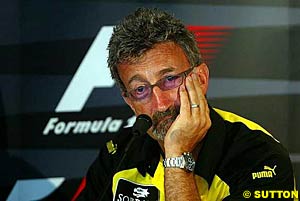 When we first sat down for an interview, at the San Marino Grand Prix, the headline of the day was FIA president Max Mosley's proposed changes for 2008 and beyond. Jordan was livid - he had much to say about the bigger teams and the manufacturers who, he felt then, were stalling any cost cutting measures and making competition in Formula One a matter of money, more than ever before. By the time that interview was transcribed and ready for press, however, the teams have met in Monaco and all agreed unanimously to speed up the changes for as early as 2005. Jordan was optimistic, the teams were united, and that interview was rendered irrelevant.
When we first sat down for an interview, at the San Marino Grand Prix, the headline of the day was FIA president Max Mosley's proposed changes for 2008 and beyond. Jordan was livid - he had much to say about the bigger teams and the manufacturers who, he felt then, were stalling any cost cutting measures and making competition in Formula One a matter of money, more than ever before. By the time that interview was transcribed and ready for press, however, the teams have met in Monaco and all agreed unanimously to speed up the changes for as early as 2005. Jordan was optimistic, the teams were united, and that interview was rendered irrelevant.
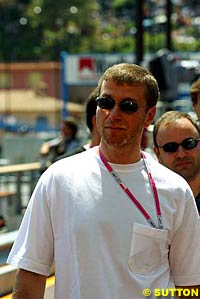 BG: The reports mention that part of the deal would see you left with minority shares. Are you ready to let go of your team? Stop being an owner?
BG: The reports mention that part of the deal would see you left with minority shares. Are you ready to let go of your team? Stop being an owner?
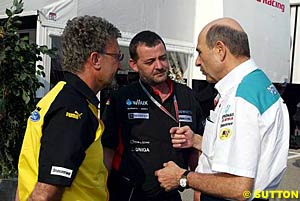 There are three privateers left in Formula One today - Sauber, Jordan and Minardi - and the latter two have been struggling with lack of funds and a major expense on an engine that is far weaker than that of the front-runners. Jordan, obviously, loved the recent proposal from the FIA - sent to the teams last week - which included an option of forcing the automakers to supply competitive engines free of charge to more than one team.
There are three privateers left in Formula One today - Sauber, Jordan and Minardi - and the latter two have been struggling with lack of funds and a major expense on an engine that is far weaker than that of the front-runners. Jordan, obviously, loved the recent proposal from the FIA - sent to the teams last week - which included an option of forcing the automakers to supply competitive engines free of charge to more than one team.
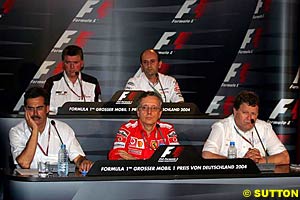 BG: Did you know that the FIA are going to bring up such a proposal?
BG: Did you know that the FIA are going to bring up such a proposal?
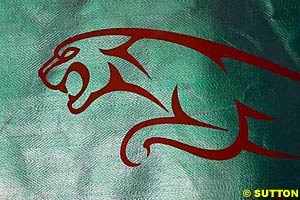 Ford are currently at the centre of paddock speculations, over the future involvement of the car giant in Formula One. Persistent rumours suggest the American automaker will rename its team, Jaguar Racing, to Ford, while other speculations suggest Ford might pull out of Formula One altogether, after cutting down their investment in the F1 programme as well as in other motor sports. Amidst all this uncertainty, Minardi announced last week a new agreement with the Ford-owned Cosworth engine maker, which will see the Anglo-Italian team supplied with brand new engines, identical to those provided to Jaguar (or whatever that team would be called).
Ford are currently at the centre of paddock speculations, over the future involvement of the car giant in Formula One. Persistent rumours suggest the American automaker will rename its team, Jaguar Racing, to Ford, while other speculations suggest Ford might pull out of Formula One altogether, after cutting down their investment in the F1 programme as well as in other motor sports. Amidst all this uncertainty, Minardi announced last week a new agreement with the Ford-owned Cosworth engine maker, which will see the Anglo-Italian team supplied with brand new engines, identical to those provided to Jaguar (or whatever that team would be called).
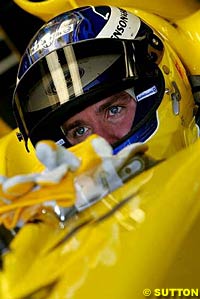 If it's not enough that the future of the team remains uncertain, the future regulations are unknown, and the engine supplier might be leaving the sport, Jordan also has the relatively minor issue of picking up drivers for next season to go through. All things considered, it is minor to the Jordan team and Jordan the man, but it is by far a major concern for his number one driver, Nick Heidfeld.
If it's not enough that the future of the team remains uncertain, the future regulations are unknown, and the engine supplier might be leaving the sport, Jordan also has the relatively minor issue of picking up drivers for next season to go through. All things considered, it is minor to the Jordan team and Jordan the man, but it is by far a major concern for his number one driver, Nick Heidfeld.
Sidebar: If I could Make it There, I'll Make it Anywhere
|
Contact the Author Contact the Editor |
Please Contact Us for permission to republish this or any other material from Atlas F1.
|
Volume 10, Issue 36
Articles
Exclusive Interview with Eddie Jordan
The Tifosi and the Samurai at Monza
Technical Analysis: 2005 Proposals
2004 Italian GP Preview
2004 Italian GP Preview
Italian GP Facts & Stats
Columns
The F1 Trivia Quiz
Rear View Mirror
Bookworm Critique
On the Road
Elsewhere in Racing
> Homepage |